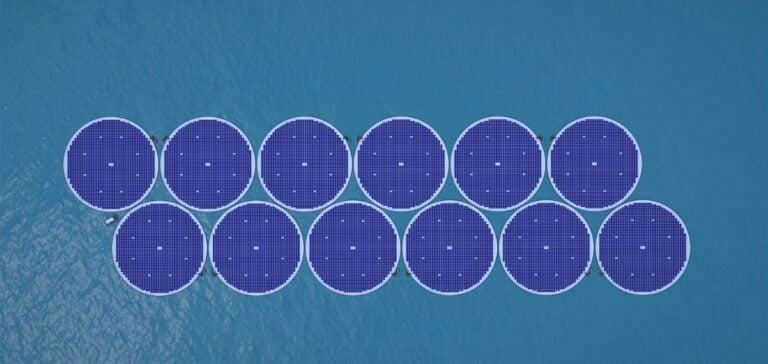Floating solar panel projects are proliferating around the world. Technbusiness presented the project to develop this technology via a consortium including EDF, Equinor, Statkraft and EDP. Statkraft is particularly committed to floating solar panel technology. The Norwegian company will build a 2 MW network on the reservoir of its Banja hydroelectric power plant in Albania.
New Floating Solar Panel Project in Albania
The birth of the project
Norwegian company Statkraft plans to start construction of a floating solar power plant with a maximum capacity of 2 MW at the Banja reservoir in southeastern Albania by the end of June, reveals SeeNews.
“Now that all regulatory approvals are in place, we have issued a notice to proceed to Ocean Sun to implement the first phase of the project. We look forward to commencing construction by the end of June,” said Tom Kristian Larsen, Senior Advisor for Intellectual Property Strategy and Asset Management at Statkraft.
The construction process
The project, with a total investment cost of around 2 million euros, will comprise two construction phases.
In the first phase, scheduled for completion in the fourth quarter of 2020, Statkraft’s supplier, Norwegian floating solar technology developer Ocean Sun, will deliver a complete 0.5 MWp DC floating system to the reservoir.
The second phase will see Statkraft add three further 0.5 MWp floating units in 2021, bringing the total solar capacity of the Banja reservoir to 2 MWp.
Starkraft continues to expand in Albania
Statkraft, a leading international hydropower company and Europe’s largest producer of renewable energy, is present in Albania through its wholly-owned subsidiaries Devoll Hydropower and Statkraft Renewables Albania.
Stakeholders in the Banja Floating Solar Panel Project in Albania
Companies involved in the project
Ocean Sun is a Norwegian company developing a new technology for floating solar energy. This technology is an effective, inexpensive and sustainable solution. It is based on modified silicon solar modules deployed on flexible floats.
Statkraft is an energy company, 100% owned by the Norwegian state. Europe’s leading producer of renewable energies, Statkraft generates electricity from wind, natural gas, hydro and solar power.
Ocean Sun’s floating solar panel technology
Ocean Sun has developed a unique “trampoline” floating solar panel technology. Unlike other floating solar panel designs, which rely on interconnected individual floats, the Ocean Sun design allows a large number of panels to be attached to the membrane as a modular unit, which usually includes a rigid perimeter frame for anchoring.
This technology has been purchased by Statkraft’s Albanian unit for deployment at the Banja reservoir in Albania. The contract is the first major commercial sale of Ocean Sun’s floating solar technology, and the project will demonstrate the viability of the technology.
The Emergence of Floating Solar Energy Technologies in Albania
Floating solar panels: a technology for the future
The World Bank’s 2018 report on floating solar – which focuses on hydroelectric power plants, water reservoirs and onshore installations – concluded that the potential for this technology was 400GW, even under conservative assumptions. With coastal and offshore development, the market would be enormous.
Although floating solar power remains an emerging technology, land-based installations are seen as an increasingly attractive option for large-scale deployment of photovoltaic systems on reservoirs and alongside hydroelectric facilities, particularly where land is limited.
Floating solar panel technology fits Statkraft’s strategy
Testing a new technology for floating solar panels fits in perfectly with Statkraft’s strategy, explains GlobeNewswire. The aim is to develop the company’s renewable energy production from hydroelectricity, wind power and solar energy. If the technology is successful and the potential for cost-competitiveness can be achieved, wider application of floating solar power may also take place at other Statkraft sites.
“Ocean Sun is very pleased to begin construction of Statkraft. The project represents the first large-scale installation in southern Europe, and an important step in our quest for clean, affordable energy from floating solar power on a global scale,” says Børge Bjørneklett, CEO of Ocean Sun.
Current floating solar panel projects around the world
The largest project of this type is currently a 150 MW development in Anhui, China, but, as reported by Reload NewsIt will soon be eclipsed by massive developments elsewhere in the world, including a 1 GW plant in India and a sprawling 2.9 GW complex off the coast of South Korea.
Europe has made progress in recent months in developing the market for “high wave” floating photovoltaic systems, with several projects under development for offshore sites.






















